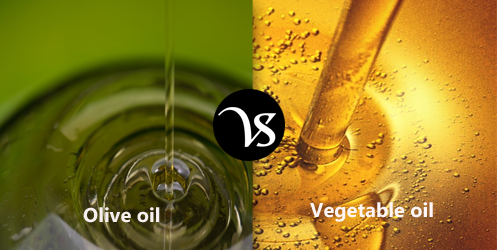#health #EVO #Canola
Plant oils are staples used for cooking practices like sautéing or frying vegetables, making sauces, drizzling onto pizzas, and preventing pasta from sticking together.
Olive Oils and vegetable oils are some of the most popular plant oils used around the world, each have unique characteristics.
Here we look at the differences between olive oil and vegetable oil, including their best uses, taste, nutrition, and potential health benefits, as follows:
Olive oil and vegetable oil differ in how they are made, some are artisanal, most are commercial and processed industrially. The differences are huge in flavor and nutrition.
Once plant oils have been extracted, theyare typically cleaned with chemicals and heated to remove impurities and prolong their shelf life. The more processing an oil undergoes, the fewer nutrients and less flavor it maintains.
This is apparent when comparing minimally processed EVO (extra virgin olive oil), which boasts a distinct olive taste, with vegetable oil, which offer a generic, neutral 0r no flavor.
Olive oil is extracted from only pressed olives, with EVO being the least processed.
By contrast, vegetable oil is made by mixing oils from different sources, such as canola, cottonseed, sunflower, soybean, corn, and safflower. Thus, more processing is required to remove impurities and create a neutral or no-flavored blend.
The degree of processing that an oil undergoes not only affects its flavor but also its nutritional composition.
While both olive and vegetable oils contain unsaturated fatty acids, olive oil contains higher amounts of monounsaturated fats like oleic acid, linoleic acid, and palmitic acid. Vegetable oil contains mostly omega-6 polyunsaturated fats.
Monounsaturated fats have been found to have anti-inflammatory and heart-health benefits, whereas omega-6 polyunsaturated fats can be pro-inflammatory and harm heart health if eaten in excess.
It is worth noting that the more refining an oil undergoes, the fewer micronutrients and healthy compounds it retains
EVO the least processed type of olive oil is rich in antioxidants and anti-inflammatory compounds like tocopherols, carotenoids, and polyphenols. Minimally refined olive oil also maintains some micronutrients, such as vitamins E and K
But, the refining process used to make vegetable oil destroys micronutrients, antioxidants, and beneficial plant compounds, including tocopherols, phytosterols, polyphenols, and coenzyme Q.
Olive oil, especially EVO, is among the least processed cooking oils on shelves. This means it retains the most antioxidants, vitamins, and minerals.
For example, the antioxidant and polyphenolic compounds in olive oil have been extensively researched for their heart health benefits
Vegetable oil, on the other hand, undergoes a lot of processing to neutralize its flavor and blend several types of plant oils. This means it has minimal beneficial nutrients, leaving just empty calories.
Swapping vegetable oil for olive oil may benefit brain health.
A study I read for this article found that replacing vegetable oil with EVO improved cognitive function in older adults.
If you choose to consume vegetable oils, EVO is the healthier choice. Much better than most other vegetable oils and vegetable oil blends.
The processing of vegetable oil leaves it lacking in many of the healthy micronutrients and plant compounds that may otherwise be found in the plants used to make it. It is also high in omega-6 fatty acids, which can contribute to inflammation.
EVO, on the other hand, retains several trace vitamins and minerals and is rich in antioxidants and anti-inflammatory monounsaturated fatty acids that may benefit heart and brain health.
If you choose to include plant oils in your eating plan, minimally processed EVO is the healthier choice when compared with most other vegetable oils.
Eat healthy, Be healthy, Live lively









